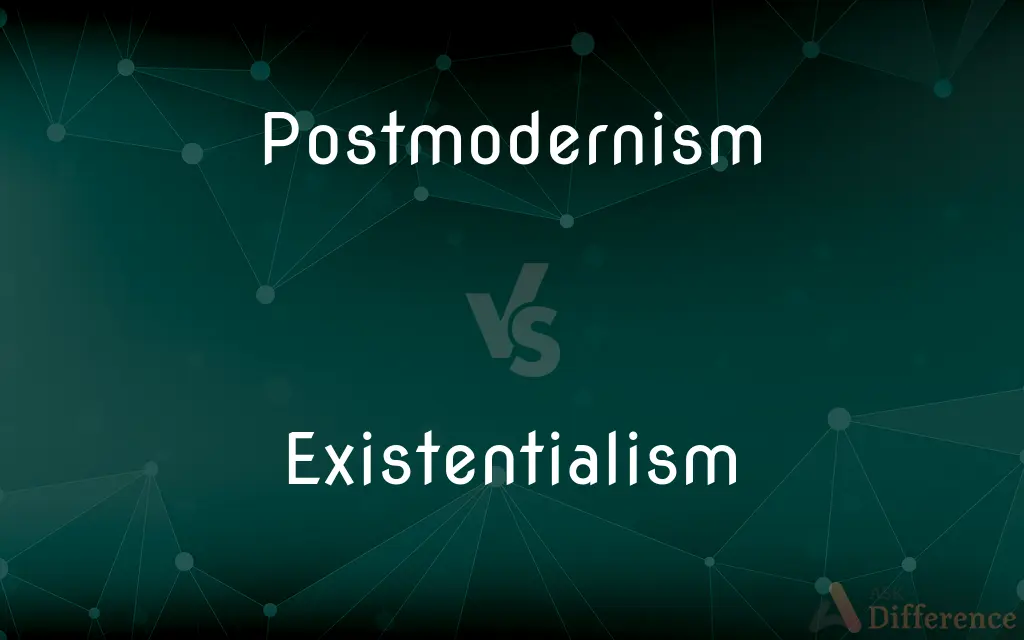Postmodernism vs. Existentialism — What's the Difference?

Difference Between Postmodernism and Existentialism
ADVERTISEMENT
Compare with Definitions
Postmodernism
Postmodernism is a broad movement that developed in the mid-to-late 20th century across philosophy, the arts, architecture, and criticism, marking a departure from modernism. The term has been more generally applied to describe a historical era said to follow after modernity and the tendencies of this era.
Existentialism
Existentialism ( or ) is a form of philosophical inquiry that explores the problem of human existence and centers on the experience of thinking, feeling, and acting. In the view of the existentialist, the individual's starting point has been called "the existential angst," a sense of dread, disorientation, confusion, or anxiety in the face of an apparently meaningless or absurd world.
Postmodernism
Of or relating to art, architecture, or literature that reacts against earlier modernist principles, as by reintroducing traditional or classical elements of style or by carrying modernist styles or practices to extremes
"It [a roadhouse]is so architecturally interesting ... with its postmodern wooden booths and sculptural clock" (Ruth Reichl).
Existentialism
A philosophy that emphasizes the uniqueness and isolation of the individual experience in a hostile or indifferent universe, regards human existence as unexplainable, and stresses freedom of choice and responsibility for the consequences of one's acts.
Postmodernism
Of or relating to an intellectual stance often marked by eclecticism and irony and tending to reject the universal validity of such principles as hierarchy, binary opposition, categorization, and stable identity.
ADVERTISEMENT
Existentialism
A twentieth-century philosophical movement emphasizing the uniqueness of each human existence in freely making its self-defining choices.
The heyday of existentialism occurred in the mid-twentieth century.
Postmodernism
Any style in art, architecture, literature, philosophy, etc., that reacts against an earlier modernist movement.
Existentialism
The philosophical views of a particular thinker associated with the existentialist movement.
Sartre's existentialism is atheistic, but the existentialism of Marcel is distinctly Christian.
Postmodernism
An attitude of skepticism or irony toward modernist ideologies, often questioning the assumptions of Enlightenment rationality and rejecting the idea of objective truth.
Existentialism
A philosophical theory or attitude having various interpretations, generally emphasising the existence of the individual as a unique agent with free will and responsibility for his or her own acts, though living in a universe devoid of any certain knowledge of right and wrong; from one's plight as a free agent with uncertain guidelines may arise feelings of anguish. Existentialism is concerned more with concrete existence rather than abstract theories of essences; is contrasted with rationalism and empiricism; and is associated with Kierkegaard, Heidegger and Sartre, as well as others.
Postmodernism
Genre of art and literature and especially architecture in reaction against principles and practices of established modernism
Existentialism
(philosophy) a 20th-century philosophical movement; assumes that people are entirely free and thus responsible for what they make of themselves
Share Your Discovery

Previous Comparison
Soybean vs. Bean
Next Comparison
Design vs. Layout













































